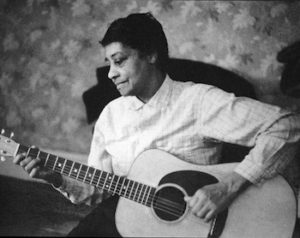
Elizabeth Cotten
*This date marks the birth of Elizabeth Cotten, a Black folk and blues musician, born in 1893.
Cotten was born into a musical family near Chapel Hill, North Carolina, in an area later incorporated as Carrboro. Her parents were George Nevill and Louisa Price Nevill. Elizabeth was the youngest of five children. She named herself on her first day of school when the teacher asked her name because, at home, she was only called "Li'l Sis."
By the age of eight, she was playing songs. At age nine, she was forced to quit school and began work as a domestic worker. At twelve, she had a live-in job at Chapel Hill. She earned a monthly dollar her mother had saved to buy her first guitar. Self-taught and proficient at playing, her catalog included many rags and dance tunes. By her early teens, she was writing her own songs, one of which, "Freight Train," became one of her most recognized. She wrote the song to remember a nearby train she could hear from her childhood home. The 1956 U.K. recording of the song by Chas McDevitt and Nancy Whiskey was a major hit and one of the main influences on the rise of skiffle in the U.K. Around the age of 13, she began working as a maid with her mother.
On November 7, 1910, at 17, she married Frank Cotten. The couple had a daughter, Lillie, and soon after, Elizabeth gave up guitar playing for family and church. Elizabeth, Frank, and their daughter Lillie moved around the eastern United States for several years, between North Carolina, New York City, and Washington, D.C., and finally settled in the D.C. area. When Lillie married, Elizabeth divorced Frank and moved in with her daughter and her family. Cotten retired from guitar playing for 25 years, except for occasional church performances.
While working in a department store, Cotten helped a child wandering through the aisles find her mother. The child was Peggy Seeger, and the mother was the composer Ruth Crawford Seeger. Soon after this, Cotten again began working as a maid, this time for Ruth Crawford Seeger and Charles Seeger, and caring for their children, Mike, Peggy, Barbara, Penny, and Pete Seeger, a son of Charles from a previous marriage), she remembered her guitar playing from 40 years prior. She picked up the instrument again and relearned to play it. In the latter half of the 1950s, Mike Seeger began making bedroom reel-to-reel recordings of Cotten's songs in her house. These recordings later became the album Folksongs and Instrumentals with Guitar, released by Folkways Records in 1958.
Peggy Seeger took the song "Freight Train" to England, where it became popular in folk music circles. British songwriters Paul James and Fred Williams misappropriated and copyrighted it as their composition. Under the advocacy of the influential Seeger family, the copyright was restored to Cotten. Nevertheless, it remains discredited in many sources.
Since the release of that album, her songs, especially her signature song, "Freight Train," have been covered by Peter, Paul, and Mary, Jerry Garcia, Bob Dylan, Joe Dassin, Joan Baez, Devendra Banhart, Laura Gibson, Laura Veirs, His Name Is Alive, Doc Watson, Taj Mahal, Geoff Farina, Esther Ofarim and Country Teasers. She did not begin performing publicly and recording until she was in her 60s. Her interest in her work inspired her to write more songs to perform, and in 1967, she released a record created with her grandchildren, which took its name from one of her songs, "Shake Sugaree." The song featured 12-year-old Brenda Joyce Evans, Cotten's great-grandchild and future Undisputed Truth singer.
Using profits from her touring, record releases, and awards given to her for her contributions to the folk arts, Cotten moved with her daughter and grandchildren from Washington, D.C., and bought a house in Syracuse, New York. She could also continue touring and releasing records well into her 80s. Her album Folksongs and Instrumentals with Guitar was placed into the National Recording Registry by the Library of Congress as "culturally, historically, or aesthetically significant." The album included her signature recording, "Freight Train." In 1984, her live album Elizabeth Cotten Live won her a Grammy Award for Best Ethnic or Traditional Folk Recording at the age of 90. That same year, Cotten was recognized as a National Heritage Fellow by the National Endowment for the Arts.
She was a self-taught left-handed guitarist who played a guitar strung for a right-handed player but played it upside down. This position meant she would play the bass lines with her fingers and the melody with her thumb. Her signature alternating bass style has become known as "Cotten picking." Elizabeth Cotten died on June 29, 1987, at Crouse-Irving Hospital in Syracuse, New York, at 94. In 1989, Cotten was one of 75 influential African American women in the photo documentary I Dream a World. In 2022, she was posthumously inducted into the Rock and Roll Hall of Fame as an early influence.
